Playing Poor, the National Pastime
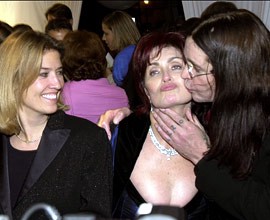
It’s the best proven technique: “I can’t imagine Fox News Channel or friend of Fox News Channel having some fancy ‘launch party’ at a fancy NYC upper east side address with a bunch of celebrities for a new cable news show,” says Greta van Susteren. (A patently untrue thing, as those of us who were there for the last one will recall.) She now makes north of a million dollars a year; I’m sure she’s never been to a fancy party with celebrities in her life. (She also works for someone who rents out his boat for $300,000 a week, you know.) This poor-acting is maybe something she picked up from her husband’s time working for Sarah Palin — Palin (and Rush Limbaugh and Glenn Beck) all love to play the Common People, even while their annual salaries are literally in the tens of million a year. It’s sort of maddening! Not because they shouldn’t be rich, because, why not, but because it hasn’t actually seemed obvious to everyone in America that millionaires are impersonating them while telling them what they should think as fellow working people! (I feel this way about Bill Clinton somewhat too, to be fair.) What’s really nuts-making is: if we live in a country with so much class resentment against rich people — on both the “left” and the “right” — why can’t we actually use it to gin up some class warfare? It is probably because everyone can’t tear themselves away from the teevee.
It's Really None Of Your Business, But Aretha Franklin Is Feeling Better
“I don’t have to talk about my health with anybody other than my doctors. The problem has been resolved … I am not one to do a lot of talking about my personal health or business. There are a lot of people who will talk about anything, as long as there is somebody listening. That’s not Aretha.”
— It’s nice to know that after all these years, Aretha Franklin’s policy in regards to her doctor visits is the same: she doesn’t have time to sit and chit and sit and chit-chat about it. It’s even nicer to know that’s she’s feeling better after last month’s news that had she had pancreatic cancer.
New Yorkers Irked By Competent Service
“They plowed at 6 a.m. — they woke me up! It was pretty noisy. The super said everyone on the front side of the building could hear them. At least three plows went by [in an hour]!”
— Midtown resident Henry Falcon expresses displeasure at the efficiency with which the city’s snow removal operations were conducted, proving once again that New Yorkers will find a way to complain about everything.
The Annual Visit to Detroit: The Car Industry's Big Millennial Grab
by Sam Dean
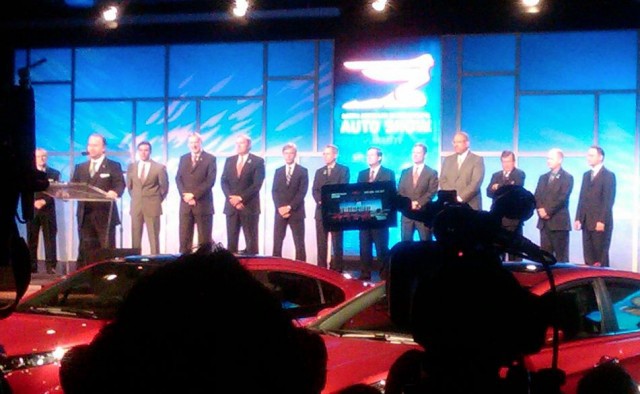
A few days ago, in my professional capacity as a Japanese TV News Producer (read: guy who carries tripod, tells police, “sorry, we’ll leave”), I was dispatched to Detroit for the North American International Auto Show.
The first day began with the Car of the Year awards, and the first of many bad metaphors to come: “Michigan’s film industry is also booming, so to put this in film terms: this is the feel-good movie of the year, and the NAIAS is the theater.” On stage, the CEOs lined up almost Von Trapp-style, except for that one guy on the right. The Chevy Volt beat out the all-electric Nissan Leaf and the nobody-cared Hyundai Sonata for the award, and a bunch of people yelled in excitement. As my Japanese colleagues noted, it isn’t really an electric car, and it would be nice if they stopped lying and just called it a hybrid.
I later found out that Nissan didn’t even bother setting up a booth at the show, having decided, probably wisely, to focus on China and India instead. No word on whether they’ve gone as far as Cadillac to court the Chinese consumer, though. (Also, having a film called “The Birth of a Party” about the rise of your Communist Party just doesn’t sound right.)

For the next few hours, I alternated between watching our pile of equipment and moving our pile of equipment somewhere else while my boss, the anchorman, did some reports from the floor. Each car company has a complex unto itself, giant booths for giant wares. Acura has an open espresso bar with little pretzel almond toffee stick snacks, but I’m stuck watching the stuff near Toyota’s joke stretch minivan. It’s called the “swagger wagon,” and goes along with a black and white ad of white parents rapping about something. It’s playing on a loop on a giant screen without sound, so I’m just gonna guess that it’s a little bit funny, a little bit cringey.

Toyota’s big press conference was for the new “Prius family,” featuring a station wagon, a little coupey guy, and a plug-innable Prius. In keeping with the Japanese aesthetic of wabi-sabi (N.B.: j/k), all of the music during the presentation seemed to be Wii-generated.
I only see Detroit itself from the rental car in the middle of the day, when I have to drive my boss to the airport. For such a famously blighted city, it seems pretty much like any other boring place, distinguished only by the highway signs for the Bridge to Canada and its angry public art. For lack of expertise and fear of offending those Detroit scholars out there, I will keep it to one comment: The GM tower complex resembles nothing so much as Orthanc, the Black Tower of Isengard, and I commend the journalists of the bailout for not making more comparisons along those lines. (I guess Ents=UAW?!)
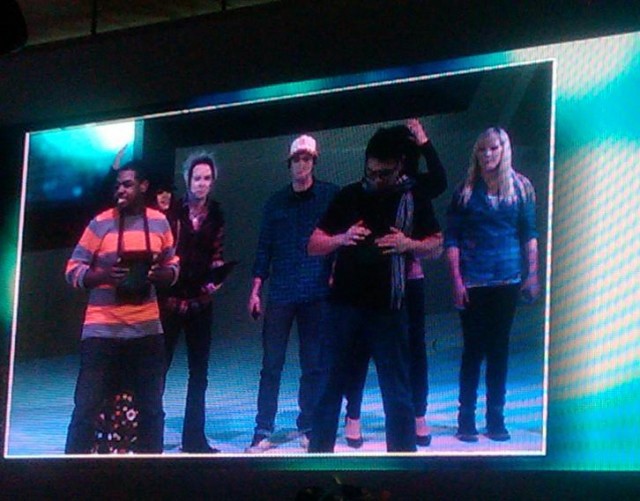
Gen Yers, or Millennials, or what have you, are notoriously uninterested in buying cars, and our withholding seems to have driven the car companies mad with desire. Besides the booth babes (who I thank for the many mints), I’m probably the youngest person here, so let me just say: as much as we youngs like iPads, and think that playing instruments on iPads is the coolest thing ever, and love having parties on stage while a bunch of old guys in suits watch us have our awesome iPad instrument parties, we still probably won’t buy a Chevy.
A Hyundai, on the other hand, now that’s a totally different story! The company’s Detroit press conference kicked off a new campaign, with both a new, totally not generic/insipid slogan (“New Thinking. New Possibilities.”) and a new “brand theme song.” Turns out they had a hard time coming up with the theme song, though, so, as the CEO told us, they “wondered if it could be found… by having OUR CARS PLAY A GIANT MUSIC BOX.”
Unsurprisingly, after designing and filming an elaborate hanging steel paddle system wherein a bunch of cars with sticks welded on their roofs could hammer out a song, they found what they were looking for. GMB-based composition is known for its results-based performance in the corporate jingle field.
After a juiced-up PowerPoint interlude, Hyundai hit paydirt: “a new car segment aligned with the needs of Generation Y.” And what might those needs be? Efficiency? Cheapness? Ability to serve as temporary home when it becomes clear that our apartment is made of nothing but bedbugs and drywall? Wrong! We need “The Urban Offroad,” a car called “The Curb” that can handle anything, “from potholes to nightclubs,” and rolls on 22s, which are only 2 inches away from 24s — the most urban of tire dimensions. It also has retractable bike rack, “so the owner could park and ride a ‘Fixie’ (fixed gear) bike to the rest of his destinations as an alternative transportation source.”
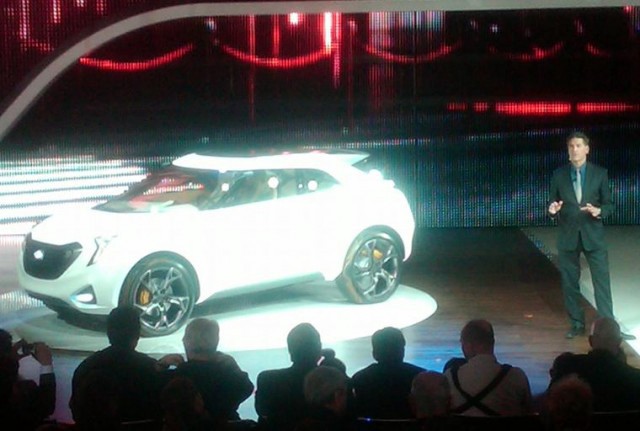
But, in case urban as an adjective isn’t quite your thing, Hyundai’s got another car for your youth-having lifestyle: The Veloster. No, it isn’t a French bicycle with claws, nor a sea bug that’s somehow grown wheels, it’s just a kind of sporty looking three-door car. According to the panel of paid youth representatives that get on stage when the thing is unveiled, though, it’s so much more. Shaved-head-with-blazer man says he’s into “performance,” and wants a car that’s both practical and fun, “but that’s just me.” Slight-dude-with-cardigan just graduated from design school and got a great job in a new city, but he misses his friends, and he’s not the best at texting, so he’s really into how the car lets you yell stuff and then sends that as a text. (One can imagine the autocorrect joy/horror).
And for cute-girl-with-long-skirt who loves fashion, the Veloster is not her first place, it’s not her second — “it’s kind of becoming my third place.” Because after the exciting, extremely social, hyper-creative lives we lead in our homes and offices, we really need a tiny pod — with doors that lock — for our “third place.”
Shortly after the youth representatives finish their brand sculpting, the PowerPoint resumed. Over a picture of the Veloster against a forest background, the words “PARADIGM SHIFT,” just like that, all caps, slid in from the left. I felt a mix of disgust and excitement at being treated so crassly. I am still always astonished at how, of all the books I’ve read and movies I’ve seen and music I’ve listened to, Dilbert remains the truest to life.
Sam Dean is a writer (and occasional TV producer). He lives in Brooklyn.
Tracks From A K-Tel Compilation Tape I Purchased When I Was Nine Just So I Could Own The "Greatest...
Tracks From A K-Tel Compilation Tape I Purchased When I Was Nine Just So I Could Own The “Greatest American Hero” Theme Song, In Order Of How Frequently And Irritatingly They Pop Into My Head Unbidden Some Thirty Years Later

13. “Oh No,” The Commodores
12. “Take My Heart (You Can Have It If You Want It),” Kool & The Gang
11.” Here I Am,” Air Supply
10. “Step By Step,” Eddie Rabbitt
9. “Being With You,” Smokey Robinson
8. “Angel of the Morning,” Juice Newton
7. “Winning,” Santana
6. “I Can’t Go For That (No Can Do),” Hall & Oates
5. “Slow Hand,” Pointer Sisters
4. “We’re In This Love Together,” Al Jarreau
3. “The Theme from ‘The Greatest American Hero’ (Believe It or Not),” Joey Scarbury
2. “Just Once,” Quincy Jones
1. “Cool Night,” Paul Davis
Alex Balk is old.
Are You Grieving The Wrong Way?
Are Elizabeth Kubler-Ross’ five stages of grief (denial, anger, bargaining, depression and acceptance) really the way we process loss? A journalist says no.
Taste Has Never Met Shame: I Love You, Conor Oberst!
by Ben Dolnick
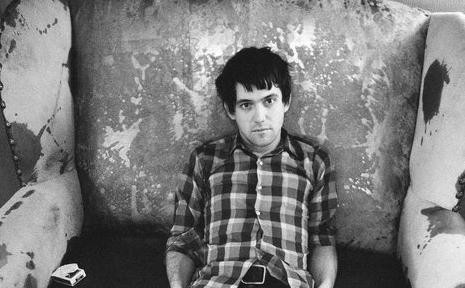
Seven or eight years ago, when I wasn’t yet old enough to feel embarrassed about it, I saw Conor Oberst play at a bar downtown. Before he went onstage — a stage that was really just a foot-high platform with a stool — he sat drinking in a booth with some friends. Having been drinking myself, I made my way to his table, where I stood as if I were a waiter, and, realizing too late that I ought never to have come over at all, I sputtered some combination of the words love and music and so much. He gave me a much friendlier look than I deserved, signed a scrap of paper for me, and turned away, mortified on my account.
My shame that night was of a particular, botched-encounter variety, but in the years since, the feeling has broadened into something more general, until it’s become one of the main emotions I associate with his music. Sometimes I think there ought to be a coat of arms for all of us who listen to Oberst’s band Bright Eyes past the age of twenty-six. WITH LOVE AND SHAME, the motto would read. The handwriting would be the cramped and tortured scribble of a high school freshman.
At various points in the past few years — when, at more recent of his concerts, I’ve felt, amidst the mascara-streaked faces, like a childless man lingering at the edge of a playground — I’ve imagined that my love for Conor Oberst was finally preparing to die a respectable death. But lately, as I’ve been waiting for his new album, checking Amazon a couple of times a day to see if, by some freak accident, it’s slipped into the world early, I’ve given up. Years from now, when I’m wandering through life bald and L.L. Bean-jacketed, I’ll probably still be listening to him tremulously describing his beloved high school girlfriend combing her hair, and I’ll probably still be both ashamed and covered with goosebumps. But why the shame? And, come to think of it, why the goosebumps?
The long version of an explanation for my love would include defensive references to Elliott Smith and Bob Dylan, as well as an anxious discussion of his surprising way with lyrics, his disarming voice, his shockingly steady output (ten-plus albums, beginning when he was fifteen) and a dozen other things.
The shorter and more honest version, though, would amount to not much more than: play “Light Pollution” starting at about 2:10 and listen for at least thirty seconds. Does that part at 2:26 when his voice kind of lifts off from the line he’d been singing, as if some booster-rocket of emotion had deployed, do anything for you? If so, I’ll see you at Radio City in March.
If not — or if what it does for you is akin to what a bite of Thai food does for someone with the cilantro-hating gene — then no amount of argumentation is going to convince you. Not for you is my insistence that his last few albums are actually considerably less mawkish than his early ones, or that his satisfyingly screamy side-project Desaparecidos is worth a listen. Oberst is one of those musicians that some people hate in a visceral, biological way. From his first albums, in which he sounds like someone’s clinically depressed little brother who’s gotten hold of an answering machine, to “Lua,” that weirdly successful single from a couple of years ago in which he sings “I know that it is freezing” in a voice so fragile that it sounds as if he may himself freeze like a baby bird left out in the snow, these people find him not just bad but laughable and somehow offensive. Do his eyes really need to look quite so wide and unguarded in almost every photograph? Couldn’t he at least brush his hair out of his face?
And the thing is, I don’t need to look outside myself for a person who feels this way. The eye-rolls are coming from inside the house. This is the peculiar burden and shame of the no-longer-young Bright Eyes lover: within him is a Bright Eyes hater, only he can’t be heard over the shouts of “I love you, Conor!” coming from upstairs. I know very well that to admit to loving Bright Eyes is to admit to having an overgrown brain region devoted to self-pity, sentimentality, regret and a handful of other not very appealing emotional states.
And yet: there’s no musician I love more. “A Line Allows Progress…” is the kind of song that Macaulay Culkin might sing if The Good Son were ever turned into a Broadway musical, but that part at 1:05 when his voice wobbles on “stumble ‘round the neighborhood…” has been, on dozens of cold afternoons when I’m running errands ‘round the neighborhood, more dear to me than my winter coat. “First Day of My Life” is, in its way, as syrupy as any Michael Bublé serenade, but it happens to be a syrup perfectly engineered to flood my emotional circuit-board.
This stubbornness of taste is one of the things, as I approach thirty, that I’m learning to accept. Our senses of taste couldn’t care less about our carefully plotted visions for ourselves. I would love to love Saul Bellow, but by page fifty of Herzog, something within me has wandered into another room. Taste doesn’t work for reason; reason is a skinny underpaid clerk in the office of taste. Taste occasionally dumps a heap of papers on reason’s desk and says: Here! I like Face/Off but hate both Nicholas Cage and John Travolta! Explain that! And so reason stays late constructing tenuous arguments, while taste goes home to watch “King of Queens.”
But here, anyway, is one of the arguments my reason has come up with while my taste has been counting down the days until “The People’s Key”: we ought to be grateful to Conor Oberst for daring to be so embarrassing.
It must feel bizarre, at almost thirty-one, looking out from the stage each night and seeing this ocean of loving adolescent faces. He must be tempted to make an album that wouldn’t occasion such goo, something cold and brainy or something soulless and slick, anyway something that wouldn’t have so much of his own feeling in it. But year after year, album after album, he puts his undisguised, quavering self on public display.
And that takes a weird kind of bravery, in a culture like ours. Look at the Huffington Post or TMZ or Gawker. Look at the percentage of stories that are about people getting SMACKED DOWN or BUSTED or HUMILIATED IN A LIVE INTERVIEW, or else are about people falling on their faces (sometimes literally) or being photographed at inopportune moments. Think how bad it feels, being laughed at. Feel how tempting it must be, as a musician, to pull your head back into your shell and record an album of electronic trance music that Pitchfork would give a 9.4.
But enough with reason.
Nabokov, in one of his many smart and crabby lectures, said that the only important organ for evaluating an artist is the stretch of flesh between the shoulder-blades. “That little shiver,” he said, “is quite certainly the highest form of emotion that humanity has attained.”
Well, going solely by the flesh between my shoulder-blades, Conor Oberst has been the most important artist of my adult life. More important than Alice Munro, more important than Philip Roth, more important than the Beatles, the Coen brothers, Tolstoy, Chekhov, Updike, Joyce, Nabokov himself — these giants, these heads on Mount Rushmore, these warranters of two-full-page-obituaries, have each caused me fewer moments of neck-hair-raising bliss than a sulky, elfin, musically undistinguished guitar-playing kid from Omaha. My frontal lobe may as well get used to it.
Ben Dolnick lives in New York. His new novel, You Know Who You Are, comes out in March.
By And About Charles Portis
A few links from the archives for the Charles Portis fans out there: The Atlantic has a memoir, “Combinations of Jacksons,” and a short story, “I Don’t Talk Service No More.” The Believer has a 7,000 word celebration by Ed Park. And the New Yorker directs you to a 1984 “Talk of the Town” piece about the author as well as a review of The Dog of the South, but both of those links are subscriber-only, so you may have to make do with the descriptions here. Enjoy.
A Documentary about the "New York Times" Media Desk!
This “coming attraction” video for Page One, a documentary about the media desk at the New York Times, makes it sound pretty boring. Seeing Sundance pitch it as “if you love newspapers, then you’ll love this!” is a terrible idea. I really don’t think that’ll be the case at all though — I think it’ll kind of be amazing. I will watch the holy heck out of this. (Subplots I am looking forward to: Watch Brian Stelter magically shrink before your eyes! Watch Richard Perez-Pena become ever more bored and depressed by his beat, until he runs off to the Jersey desk! Watch David Carr go to town on people with hilarious results!)
